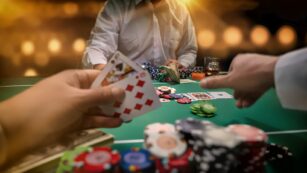Gambling isn’t just about luck; it’s a complex interplay of psychology that drives behavior and decision-making. Understanding the mental processes behind gambling can reveal why some players chase losses while others know when to walk away. The thrill of risk and reward taps into deep-seated emotions and cognitive biases, making it a fascinating topic for both casual players and serious researchers.
As the gambling industry evolves, so does the need to comprehend the psychological factors at play. From the adrenaline rush of a big win to the despair of a loss, these experiences shape how individuals approach games of chance. By exploring gambling psychology, one can gain insights into the motivations and pitfalls that accompany this age-old pastime, ultimately promoting healthier gambling habits and informed choices.
Gambling Psychology
Gambling psychology examines the mental processes that drive gambling behavior. Understanding these factors can enhance decision-making and foster healthier gambling practices.
The Human Mind and Gambling
 The human mind plays a crucial role in gambling choices. Players often rely on emotions and cognitive evaluations to navigate their experiences. Factors such as thrill-seeking, risk tolerance, and impulse control influence gambling behavior. Participants may feel excitement when winning, prompting them to continue playing. Conversely, losses can lead to frustration, affecting rational judgment. Recognizing these emotional triggers helps individuals manage their gambling experiences effectively.
The human mind plays a crucial role in gambling choices. Players often rely on emotions and cognitive evaluations to navigate their experiences. Factors such as thrill-seeking, risk tolerance, and impulse control influence gambling behavior. Participants may feel excitement when winning, prompting them to continue playing. Conversely, losses can lead to frustration, affecting rational judgment. Recognizing these emotional triggers helps individuals manage their gambling experiences effectively.
Cognitive Biases in Gambling Behavior
 Cognitive biases significantly impact gambling behavior. Players often exhibit several common biases, including:
Cognitive biases significantly impact gambling behavior. Players often exhibit several common biases, including:
-
Gambler’s Fallacy: Believing that past events affect future outcomes, which leads to misjudgments about odds.
-
Confirmation Bias: Seeking information that supports pre-existing beliefs about luck or skill, ignoring conflicting evidence.
-
Illusion of Control: Feeling an unrealistic sense of control over random outcomes, causing excessive risk-taking.
Understanding these biases enables players to make informed choices and reduces detrimental gambling habits.
The Role of Emotions in Gambling
Emotions play a pivotal role in gambling behaviors. These feelings can drive players toward both positive and negative experiences, significantly influencing their decision-making processes.
Impact of Stress and Anxiety
 Stress and anxiety can lead to poor decision-making in gambling scenarios. When players experience high levels of stress, they often resort to impulsive actions or chase losses to regain control. Research shows that stress triggers emotional responses, which can cloud judgment and enhance the potential for irrational risk-taking. Moreover, anxiety can amplify the fear of missing out on potential wins, prompting individuals to gamble even when they recognize the risks involved. This cycle can result in problematic gambling behaviors, where emotional pressures override rational thinking.
Stress and anxiety can lead to poor decision-making in gambling scenarios. When players experience high levels of stress, they often resort to impulsive actions or chase losses to regain control. Research shows that stress triggers emotional responses, which can cloud judgment and enhance the potential for irrational risk-taking. Moreover, anxiety can amplify the fear of missing out on potential wins, prompting individuals to gamble even when they recognize the risks involved. This cycle can result in problematic gambling behaviors, where emotional pressures override rational thinking.
The Excitement of Risk-Taking
The thrill associated with risk-taking can create an adrenaline rush that many gamblers find appealing. This excitement stems from the unpredictability of outcomes, stimulating a desire for repeated gambling experiences. Players often seek this high, resulting in continued engagement, even in the face of losses. Studies indicate that the anticipation of winning releases dopamine, a neurotransmitter linked to pleasure, reinforcing the behavior. This cycle of excitement and subsequent emotional fluctuation fosters a challenging environment that blurs the line between recreational gambling and addiction. Understanding this dynamic becomes essential for recognizing the influence of emotions on gambling behaviors.
Gambling Addiction and Its Effects
 Recognizing the psychological aspects of gambling is vital for fostering healthier habits. By understanding the emotional triggers and cognitive biases that influence behavior players can make more informed choices. This awareness not only helps in managing risks but also promotes a more balanced approach to gambling.
Recognizing the psychological aspects of gambling is vital for fostering healthier habits. By understanding the emotional triggers and cognitive biases that influence behavior players can make more informed choices. This awareness not only helps in managing risks but also promotes a more balanced approach to gambling.
As the landscape of gambling continues to evolve it’s essential for individuals to remain vigilant about their mental processes. By prioritizing self-awareness and emotional regulation players can navigate the complexities of gambling more effectively. Ultimately this understanding can lead to a more enjoyable and responsible gambling experience.

